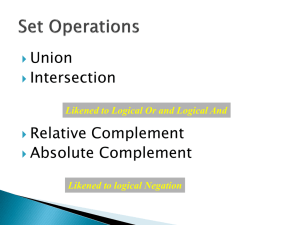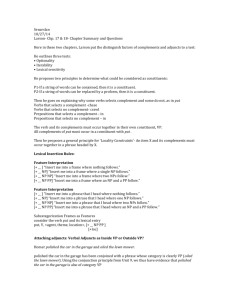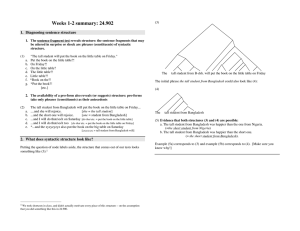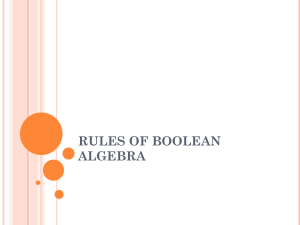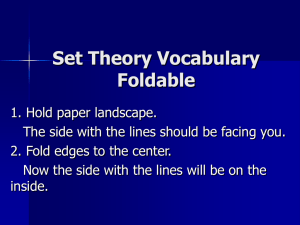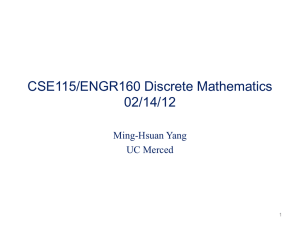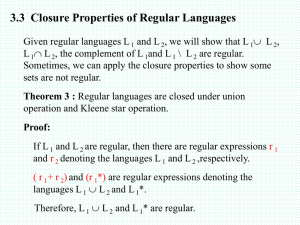Notes submitted by Highlander & Wurdinger
advertisement
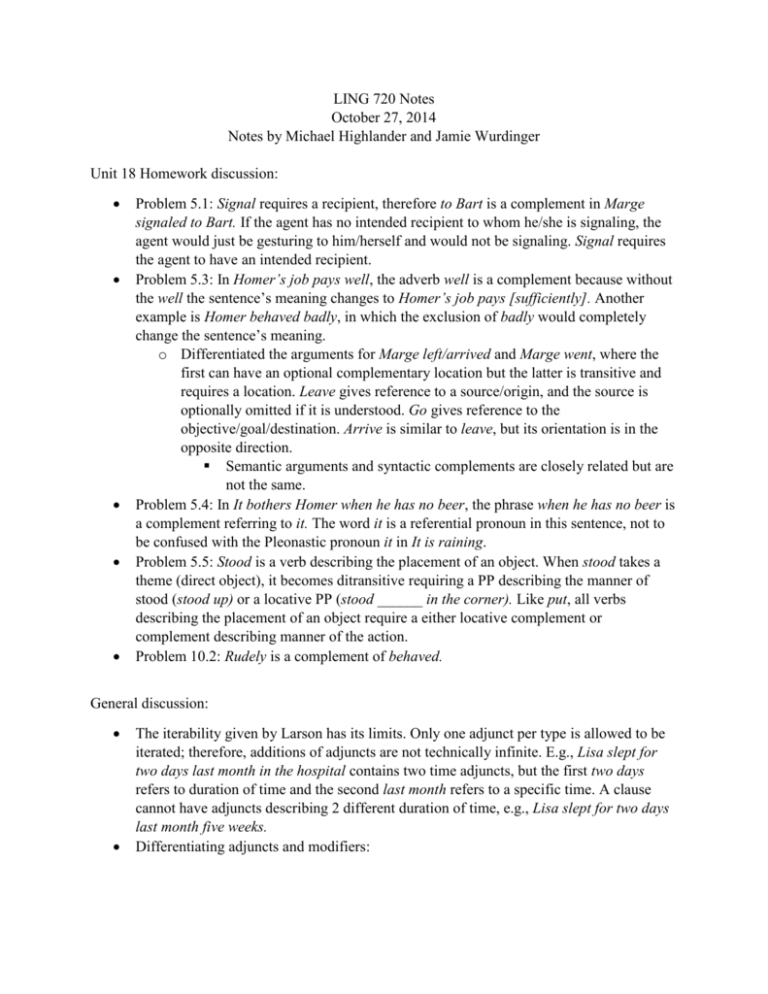
LING 720 Notes October 27, 2014 Notes by Michael Highlander and Jamie Wurdinger Unit 18 Homework discussion: Problem 5.1: Signal requires a recipient, therefore to Bart is a complement in Marge signaled to Bart. If the agent has no intended recipient to whom he/she is signaling, the agent would just be gesturing to him/herself and would not be signaling. Signal requires the agent to have an intended recipient. Problem 5.3: In Homer’s job pays well, the adverb well is a complement because without the well the sentence’s meaning changes to Homer’s job pays [sufficiently]. Another example is Homer behaved badly, in which the exclusion of badly would completely change the sentence’s meaning. o Differentiated the arguments for Marge left/arrived and Marge went, where the first can have an optional complementary location but the latter is transitive and requires a location. Leave gives reference to a source/origin, and the source is optionally omitted if it is understood. Go gives reference to the objective/goal/destination. Arrive is similar to leave, but its orientation is in the opposite direction. Semantic arguments and syntactic complements are closely related but are not the same. Problem 5.4: In It bothers Homer when he has no beer, the phrase when he has no beer is a complement referring to it. The word it is a referential pronoun in this sentence, not to be confused with the Pleonastic pronoun it in It is raining. Problem 5.5: Stood is a verb describing the placement of an object. When stood takes a theme (direct object), it becomes ditransitive requiring a PP describing the manner of stood (stood up) or a locative PP (stood ______ in the corner). Like put, all verbs describing the placement of an object require a either locative complement or complement describing manner of the action. Problem 10.2: Rudely is a complement of behaved. General discussion: The iterability given by Larson has its limits. Only one adjunct per type is allowed to be iterated; therefore, additions of adjuncts are not technically infinite. E.g., Lisa slept for two days last month in the hospital contains two time adjuncts, but the first two days refers to duration of time and the second last month refers to a specific time. A clause cannot have adjuncts describing 2 different duration of time, e.g., Lisa slept for two days last month five weeks. Differentiating adjuncts and modifiers: o Adjunction is a syntactic process of joining things in a particular way. Adjuncts are superfluous additions to the sentence. They are usually modifiers semantically. o Modifiers modify or delineate a category without changing the semantic category of the thing they are attaching to. E.g., the adjective big does not change the NP to a different word class. With the addition of big, the NP remains a NP. Modification is a semantic process, narrowing the scope of a category. It makes things more specific by identifying a relative subset within a category. E.g., with the relative modifier in big dogs, big is relative to the species of dogs; it is not saying the dog is as big as a big elephant. o Some seemingly adjunct modifiers are actually complements. E.g., according to Larson (p. 233), adjunct modifiers describe manner, frequency, duration, location, time, reason, and purpose; however, some locative PPs are complements for ditransitive verbs (e.g., put). E.g., He put the book on the shelf. Harry worded the letter carefully versus Harry wrote the letter carefully. In the former carefully is a complement; in the latter carefully is an adjunct modifier. Donated the money [to charity] (if to charity is included, it is an optional complement). o Prepositional phrases can take adjuncts. PPs can modify PPs. A phrase can have only one determiner, and it must come before the PP. The word right can be added as a determiner in a test for PP constituency. E.g., Right on the shelf. For midterm exam: P. 172 Larson, know the 4 steps to form an argument. (Know at least the process.)
